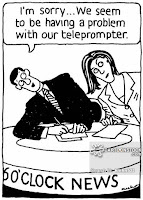Rocking the boat, in order to rock - or why I keep annoying the teleprompter people
 I haven't had to use a teleprompter much. I've been on stage or video maybe 3 or 4 times where I've used one.
I haven't had to use a teleprompter much. I've been on stage or video maybe 3 or 4 times where I've used one.Each of the times, I realized I was annoying the heck out of the person turning the script because I consistently was saying things not in the teleprompter script - sometimes changing phrasing and adding a few words; or even worse changing around the order of sentences. I did this every single time too - so on multiple takes or different rehearsals for a talk - I did something different each time. Also - I'm awful at rehearsals, but that's a different story. :-)
In general, I know I do this for most of the talks I give (most are without teleprompters!) - I know the points I want to hit, but generally make them in different ways; very often I've made up talking points right on the spot. It generally works out well. At worst, it comes off a little raw. Most recently for subject for a talk at Pubcon for subject matter I knew well, I decided to keep the same slides but changed literally everything I thought I'd say 30 mins before that talk was about to start.
I'd decided that I was doing this because it made me appear more spontaneous. I hate watching speakers that seem super-scripted. I can't help feeling that sticking to a script makes you come across as stiff, and not genuine - even if you are. I figured a free-flowing, less formal style just suits my personality better.
But as always, Hidden Brain taught me something new - that there might be more behind this.
The episode (#53: Embrace the Chaos) basically talks about why many people have done their most amazing work when they were off-balance. My favorite example was the jazz pianist whose most sublime recording was when he was playing a piano that was too small and had a whole bunch of other problems with it.
In addition to the improvisation which may force exploring new directions, the argument was basically that the additional tension forced great attention which allowed people to perform at an enhanced level.
A few years ago, I started saying before talkswhere time bounds were less of an issue, "Please interrupt me and ask questions. I find talks go better that way." I'd found that for some reason that was always true.
I now realize why - the interruptions both
- kept me on my feet and more alert through the talk
- forced me to think fresh each time - making me better not just then, but for the future.
So the next time you're doing something - particularly something you've done a lot before - consider rocking the darn boat!
Comments